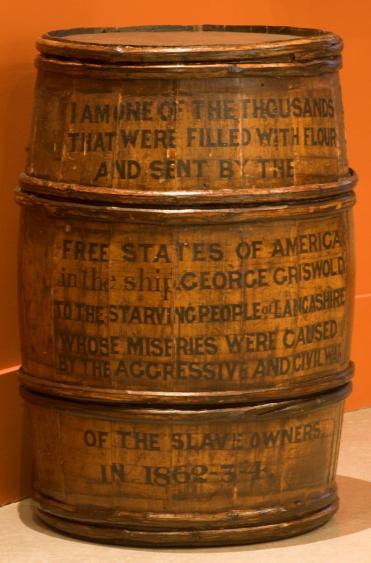How Rochdale cotton mill workers supported the emancipation (freedom) of slaves during the American Civil War
Richard Ronksley, Rochdale Sixth Form College (RSFC) Principal/CEO writes:
Now, what links Black History Month and Victorian Rochdale? It’s a fascinating story that will make you proud of the area. It starts in the middle of the 19th century, at the time of the American Civil War. The war took place between the North (the Union) and the South (Confederates). The war was about a number of things, but one of the key areas of disagreement was with regard to slavery – put simply, the South thought it acceptable, and had a whole economy based on it. Cotton (we’ll come back to that later), was a key product for the South, and slavery enabled many people to become very rich by running plantations with a workforce they didn’t have to pay, or really have any obligation to look after. If you’ve seen the film 12 years a slave, you’ll get the idea. The North, for a variety of reasons due to the nature of its economy, and beliefs, didn’t want slavery.
Now, if war affects a country its infrastructure and economy are hit in particular ways. A lot of energy goes into producing weapons, and training and looking after troops. Food is prioritised for soldiers. Normal life is disrupted, and shortages start. One of the ways the Union side disrupted life in the South was to blockade their ports and vastly restrict the export of cotton.
As our Economics students know, our contemporary economy is a web of trade that takes in all the world. The 19th century was like this, but on a much smaller scale, and Britain, at the heart the industrial revolution, was at the centre of this web of trade.
One of these webs of trade was around the cotton industry. As I’m sure you’re well aware, in Victorian times, the north west of England, was the world centre for producing cotton goods at this time. Whole towns were almost totally dependent on a single industry – cotton mills. The Civil War in America, and the blockading of cotton exports, had a drastic effect on these towns. No cotton, no work. No work, no money – there was no welfare state at that time, though some religious and co-operative groups did provide some basic relief.
In a situation like this, as you would expect, a number of cotton mill towns broadly supported the South in the civil war. You can see their reasoning. They needed cotton for their livelihoods, cotton needed plantations, plantations needed slavery; the threat of the abolition of slavery had an implication for their livelihoods.
There were exceptions to these responses. While other boroughs supported their own economic interests, workers in some towns in the north west, including Rochdale, supported the North, and the abolition of slavery. This was obviously against their immediate economic best interests, but they stood by their principles.
The American Civil War had therefore created a cotton famine in many parts of the north west of England. In response to this, the Union sent food aid to Rochdale and other parts of the north west of England, to thank them for their support.
The picture above is the final surviving barrel of this food aid. The inscription says:
‘I am one of the thousands that were filled with flour and sent by the Free States of America in the ship George Griswold to the starving people of Lancashire whose miseries were caused by the aggressive and Civil War of the slave owners in 1862-3-4‘
And where will you find this barrel? About 200 metres away from the college, in the Touchstones Museum.
Our thanks go to the BBC and David Olusoga for letting us use this video clip.

